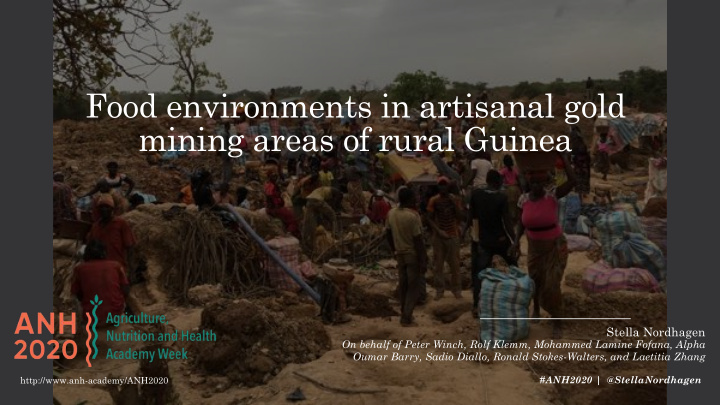



Food environments in artisanal gold mining areas of rural Guinea Stella Nordhagen On behalf of Peter Winch, Rolf Klemm, Mohammed Lamine Fofana, Alpha Oumar Barry, Sadio Diallo, Ronald Stokes-Walters, and Laetitia Zhang #ANH2020 | @StellaNordhagen http://www.anh-academy/ANH2020
Collaborators • Helen Keller International Rolf Klemm (PI) Stella Nordhagen – currently with GAIN Mohammed Lamine Fofana • Johns Hopkins Bloomberg School of Public Health Peter Winch • Julius Nyerere University, Kankan Guinea (UJNK) Sadio Diallo Alpha Oumar Barry • 18 Students / Recent Graduates
What is artisanal gold mining?
Informal sites
Boreholes, 12-20 m, up to 40 m, deep
Extraction by hand
Hand washing
Earn what you find
Study Design
Methods • 18 mining sites + associated villages/camps • Phase I Site visits, observations, stakeholder consultation • Phase II Cross-sectional survey, in two waves (n=613) In-depth interviews: Single miners (15), mothers of young children (25), food vendors (20) Observations with mothers of young children (25) Quarterly market surveys (7-8 markets) stakeholder consultation • Phase III In-depth interviews: mothers of young children (20), food vendors (20) Final Phase I Phase II, part 2 Phase III Phase II, part 1 market survey Spring 2018 Summer 2018 Summer 2019 Winter 2020 Winter 2019
Source: Turner et al. 2018
Availability & Accessibility
Prices & Affordability
“… sometimes you can spend the entire day without finding anything, and if you don’t find anything, you can’t eat.”
Food Properties & Vendor Properties
21
Desirability & Convenience
“The vendor I trust, it’s because she’s clean. It’s not that I like her, it’s the cleanliness.”
• Food environments in artisanal mining communities are dynamic; reflect interplay of consumer needs and vendor responses Concluding remarks • They are generally not conducive to good nutrition for either adults or children • Need to design and test programmatic & regulatory strategies to improve these food environments
This research has been funded by the Drivers of Food Choice (DFC) Competitive Grants Program, which is funded by the UK Government’s Thank you. Department for International Development and the Bill & Melinda Gates Foundation, and managed by the University of South Carolina, Arnold School of Public Health, USA; however, the views expressed do not necessarily reflect the UK Government's official policies. #ANH2020 | @StellaNordhagen
Recommend
More recommend